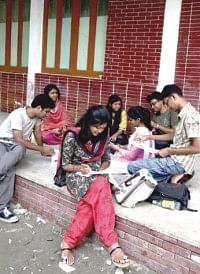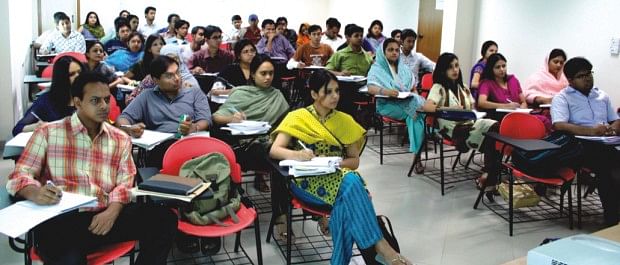Economy
Where are
all the Bright
Bangladeshis?
RAISA TASHNOVA
"I would love to come back to Bangladesh and work, but….”
 |
For students, the lure of foreign lands is always strong. Photo: Zahedul I Khan |
This is the simplest summarisation of the responses from any expatriate who has ever been asked the question of why they left this country. The reasons following the 'but' varies greatly, some being excuses to cover up a guilty conscience while others being based on solid empirical facts. But even when someone who chose the path 'out' looks for the path 'in', a hundred obstacles seem to be blocking the road.
Brain drain refers only to emigration of the educated and groomed, not the positive trend in Bangladesh of exporting manpower to earn remittances (hence bolstering our balance of payment current account). This trend of Bangladeshi citizens leaving after or for completing their tertiary level education unfortunately, has been on the up for the past few decades, with an increase from 3.6 percent in the 90s to 4.4 percent in the 21st era.
The reasons behind this increase vary from social impediments to political hurdles and most importantly, economical drawbacks of staying in the country. Leaving the country to settle abroad is undoubtedly a painful prospect for most but for others this seems the only way to a bright future.
“If I study here for four long years and get used to this life at this age, somehow I think it would be easier to get a job here then back home” states 21-year-old Tazim Ishfar Mustaffa, studying Engineering in Australia. “Mostly what we learn at this age about people and society is what we use in our work life. Thus after getting used to this western society and western work environment it is going to pose a transition problem if I choose to start my career in Bangladesh.”
Rizwana Sabreen, a dentist settled in the UK has a different type of roadblock. “The moment I set foot in London I tasted true freedom for the first time in my life. Here I walk alone at whatever time of the day I want to; here I wear what I want without worrying about ogling strangers and comments from relatives. Here I am safe, secure and truly independent.”
Apart from such social conflicts there also exists the deep rooted problem of politics and economy. “After completing my PhD in Economics at an American university, I had two options” says Najeeb Shafiq, Assistant Professor, Economics and Education, University of Pittsburgh. “The first was to return to Bangladesh and teach several classes every day, not conduct research, and struggle financially. The second was to accept a faculty position at a major American university, where I would get paid handsomely for teaching six hours a week and dedicating the rest of my time in researching any topic of interest. The simplest calculations of opportunity cost logically pushed me towards the latter.”
Speaking of our political climate 21-year-old Azfar Habib Khan studying Economics in the US says, “Our country has been spiralling downwards in terms of a positive political climate. Crime is on the rise again, rampant corruption is still the norm and even the smallest thing needs to be done through 'connections'. I refuse to live my life paying bribes or being under the protection of influential relatives.”

How can we keep our best and brightest? Photo: Zahedul I Khan
The last complaint is seconded by Hasan Imam Chowdhury, a successful financial consultant, who has shipped off his whole family to Australia and is seriously considering moving there himself. “We have never learned to value the brains” says Hasan. “Here you get a job based on who you know. Merit comes second. To know the right people you need to be politically affiliated, and to be politically affiliated you need to be criminal to a certain extent. This condition is unacceptable to the brainy and cultured and so they leave.”
Hasan went on to state how the private sector of the nation has begun to actively capture the talented of the crowd and how the government seriously needs to take a leaf out of the private sector's books. “Today the best students go into medical and engineering, the second priority is business, economics and such, the bottom of the barrel opts for BCS and government services. How can you expect a better Bangladesh in the future with such recruits in the present?”
One might argue that from the shades of a cold country, the heat of our nation may seem more intolerable than it really is. But the fact remains that we do lack a positive political image, we do lack equal job opportunity distribution in all fields and we are far behind in terms of social development, yet is it too much to expect that the bright and the brainy of the nation will work to pull her up in the world economic status ladder?
Ahsan Imon Nawroj studying electrical and computer engineering at Lafayette University, USA has just that in mind. “I do want to come back to Bangladesh because it's home,” he says, “my work so far has been in research and development and despite all that is said I don't feel that technical fields are restrictive at home in the sense that you cannot start new things. It is simply that they don't exist. If I want a well equipped lab, there might not be one. If I want funding to do research or build an innovative product, there might not be that. But I think that attitudes will change soon. Our entrepreneurs are also from our generation, and I feel that these entrepreneurs will not be content buying designs from the west, ordering parts from China and putting things together in Dholaikhal.”
Brimming with the optimism necessary to conquer defeat and build a better Bangladesh, Ahsan goes on to explain, “I believe the time when we create and innovate is very near. We just need to find our 'field', and then develop it. I think once some people from our generation steps in and picks up the weight of taking risks on the cutting edge of technology we'll have little problem reversing brain drain. So to slow down brain drain or to reverse it, it is necessary that the leaders among us step up (if they are at home) or return (if abroad) and do a really, really difficult thing: invest in start-ups; invest in innovation; dedicate lives to an idea. This will attract the international investment market and the prospect will be uphill from there on.”
When asked to justify their decision to leave most people do become defensive and paint the most pessimistic picture both as a means of satisfying themselves and to be right. But underneath it all every expatriate dreams of coming back home someday. As Tazim discovered early on, “there are other incentives, like family, friends, new relations etc. that you will not get in the richest nation of the world but in Bangladesh only”; as Hasan Chowdhury let slip, “I guess it's a life of regret - regret at not being here when I'm there and there when I'm here!”; and as Azfar finally conceded, “Bangladesh is home and I won't be able to step back from cleaning my home.” Such secret passion for the motherland is what will bring the brains back, once the tiniest sign of sustained development is seen.
|
